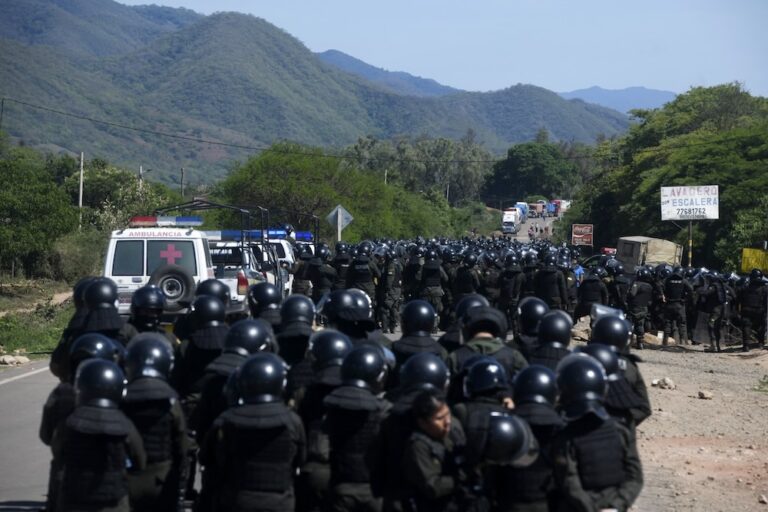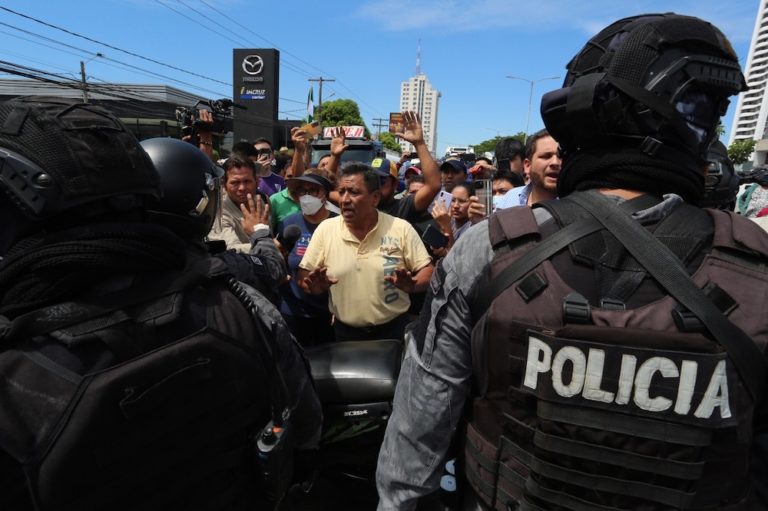(IAPA/IFEX) – The following is a 1 September 2006 IAPA press release: IAPA, ANP call on Bolivian lawmakers to adopt principles of Declaration of Sucre SUCRE, Bolivia (September 1, 2006) – The spirit of the IAPA-sponsored Declaration of Chapultepec has been incorporated into the Declaration of Sucre, a document submitted for consideration here by Bolivia’s […]
(IAPA/IFEX) – The following is a 1 September 2006 IAPA press release:
IAPA, ANP call on Bolivian lawmakers to adopt principles of Declaration of Sucre
SUCRE, Bolivia (September 1, 2006) – The spirit of the IAPA-sponsored Declaration of Chapultepec has been incorporated into the Declaration of Sucre, a document submitted for consideration here by Bolivia’s Constituent Assembly for it to include, in a new national Constitution to go into effect next year, general and fundamental principles on press freedom and freedom of expression.
The Declaration of Sucre, adopted by Bolivia’s National Press Association (ANP), states that “the right of everyone to receive information, express opinions and impart them freely without restriction” are “indispensable principles to maintain and perfect democracy.” The document was drawn up following a conference titled “The Constituent Assembly and Press Freedom”, held jointly by the Inter American Press Association (IAPA) and the ANP within the framework of the IAPA’s dissemination of the Declaration of Chapultepec.
ANP President Juan Carlos Rocha, editor of the La Paz, Bolivia, newspaper La Razón, announced the Declaration of Sucre at a press conference prior to delivering it to the Constituent Assembly, which began its scheduled year-long deliberations on August 6.
IAPA President Diana Daniels, of The Washington Post Company, Washington, DC, declared, “We trust that as the Constitution is being drafted the principles of free speech and press freedom will be taken into account. Remember that just a few words, such as those expressed in the Declaration of Sucre, are a greater guarantee of those freedoms than any long and detailed list.”
During the two-day discussions, at times heated, focus was placed on the role of news media in Bolivia, on the need for a greater plurality and diversity of voices, on restrictions on reporting and on the government’s duty to protect freedom of expression.
Regarding the press, there was discussion of the requirement to have a university degree in order to be able to work as a journalist, of the need for legislation ensuring access to public records, and for all kinds of restrictions on journalists and the media to be removed so they can work without hindrance.
At the closing luncheon today, Daniels said, “Bolivia is at the point of forming a new society. It is important that there be guarantees of a free press, applicable not only to the right to publish ideas but also to the right of the news media to express political views and cover and publish news without interference, intimidation or reprisals.”
In addition to Daniels, the IAPA delegation was made up of Felipe Edwards, vice president of the Santiago, Chile, newspaper La Segunda, Executive Director Julio Muñoz, Press Freedom Director Ricardo Trotti and Chapultepec Project Manager Sally Zamudio.
The Bolivia conference followed similar ones in Brazil and Panama that the IAPA held earlier this year under the auspices of the Robert R. McCormick Tribune Foundation.
Text of the Declaration of Sucre (in translation):
Encouraged by the holding of the Constituent Assembly of the Bolivian State, the National Press Association (ANP) and the Inter American Press Association (IAPA) held in the city of Sucre the seminar “The Constituent Assembly and Press Freedom” on August 31 and September 1, 2006.
Following discussion of ideas emerging from this meeting, the National Press Association, an organization of 14 daily and weekly Bolivian newspapers, reaffirms its conviction that freedom of expression and press freedom are indispensable principles to maintain and perfect democracy.
And it urges the Bolivian Constituent Assembly to ensure that the New Political Constitution of the State explicitly guarantee freedom of expression and freedom of the press, as established in the principles contained in Article 19 of the Universal Declaration of Human Rights and Article 13 of the American Convention on Human Rights, as well as the Declaration of Chapultepec, which enshrine the right of everyone to receive information, express opinions and impart them freely and without restrictions.
Sucre, September 1, 2006


